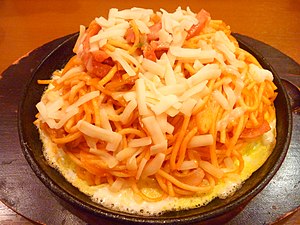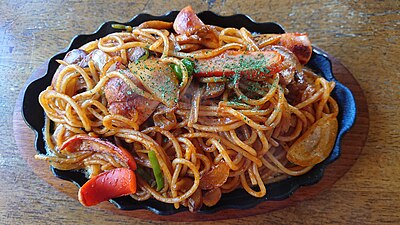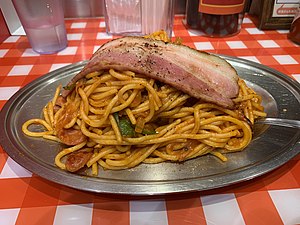Naporitan
You can help expand this article with text translated from the corresponding article in Japanese. (August 2024) Click [show] for important translation instructions.
|
 | |
| Place of origin | Japan |
|---|---|
| Main ingredients | spaghetti, ketchup |
| Ingredients generally used | bell pepper, mushrooms, onions, sausage, bacon |
Naporitan or Napolitan (Japanese: ナポリタン) is a popular Japanese itameshi pasta dish. The dish consists of soft-cooked spaghetti, tomato ketchup, onion, button mushrooms, green peppers, sausage, bacon and optionally Tabasco sauce. Naporitan is claimed to be from Yokohama.[1]
Origin
[edit]
Naporitan was created by Shigetada Irie (入江茂忠), the chef of the Hotel New Grand in Yokohama, for general Douglas MacArthur. Because available ingredients were limited after World War II, he had to use what was on hand for the general, who lived at the hotel with his wife.[1]
Name
[edit]The chef named the dish after Naples, Italy (hence "Napoli"). Phonetically, the Japanese language does not distinguish R and L as separate sounds, and so uses the same katakana characters to represent R and L sounds of Western alphabets. Thus when converting katakana back into English, based solely on the Japanese spelling in the English alphabet is ambiguous and can vary. The spelling Naporitan is derived from the usual romanization of Japanese, while the spelling Napolitan takes the origin of the name into account. This could be roughly translated as Neapolitan.
Gallery
[edit]-
With sausage and broccoli
-
With cheese
-
With bell peppers
-
With bacon
See also
[edit]- Yōshoku
- Itameshi
- List of pasta dishes
- Neapolitan ragù
- Filipino spaghetti, a similar pasta dish from Philippines
References
[edit]- ^ a b スパゲッティナポリタンは横浜生まれ! (PDF) (in Japanese). Archived from the original (PDF) on 2011-05-23.
- ^ City-Cost. "What's in a name? Nagasaki toruko rice continues to mystify". Kyodo News+. Retrieved 2024-09-21.
- "ナポリタン! Naporitan, I'm crazy for Naporitan spaghetti!", Fuso "smick" sha – November 2004, ISBN 978-4-594-04832-7 (Japanese)







!["Toruko rice". Tonkatsu, pilaf, and Neaporitan are common. Although the name is derived from Turkey, the dish was created in Japan.[2]](http://upload.wikimedia.org/wikipedia/commons/thumb/6/68/Toruko_rice_Cafe_Olympic.jpg/300px-Toruko_rice_Cafe_Olympic.jpg)